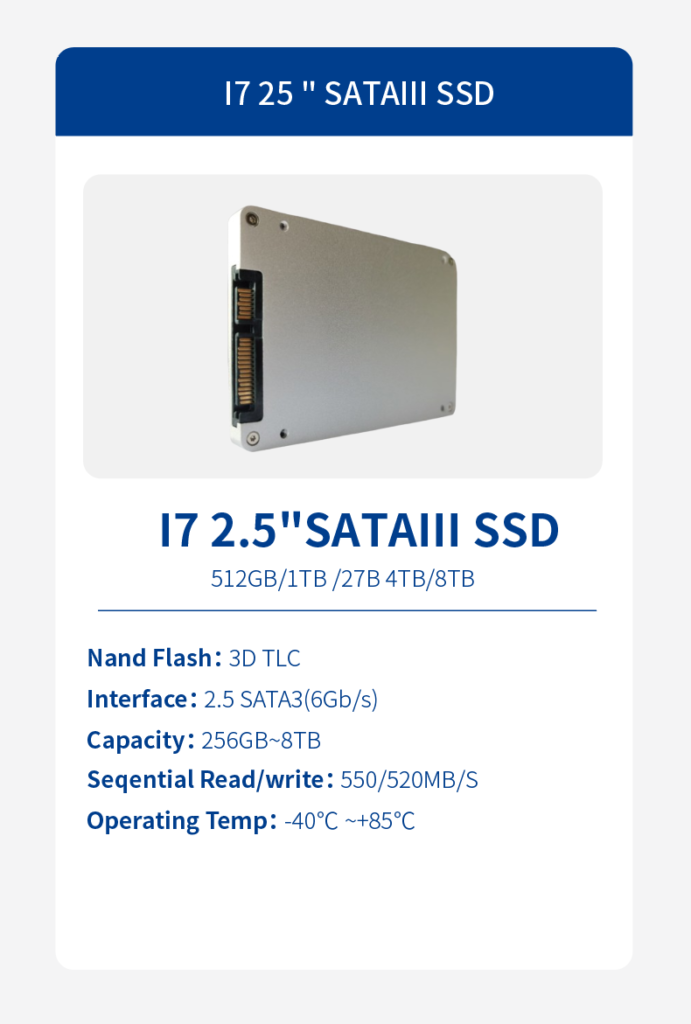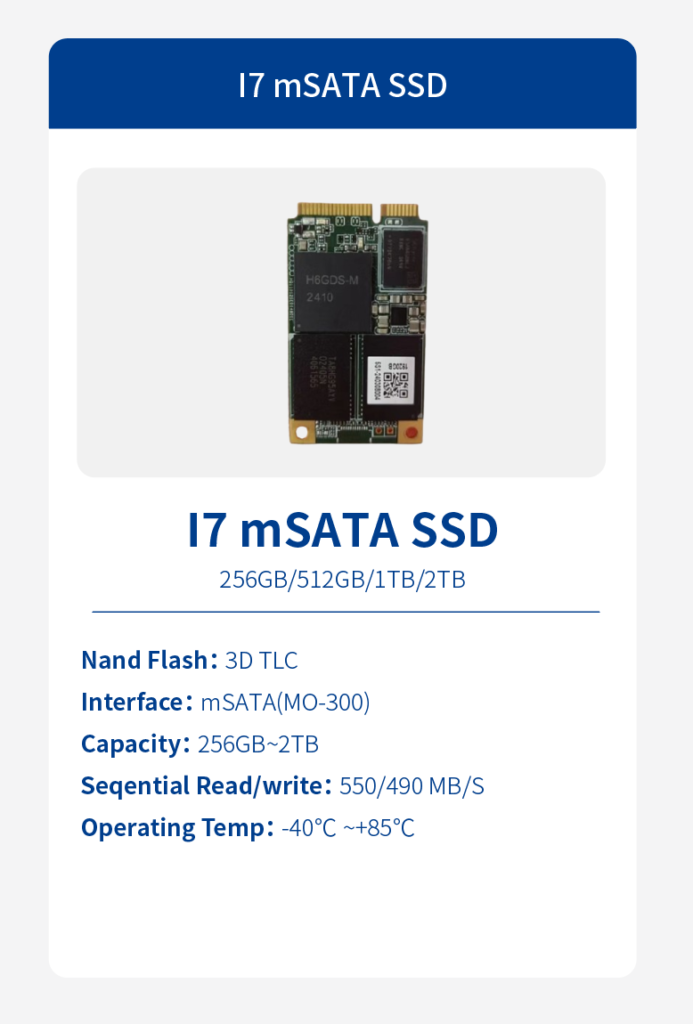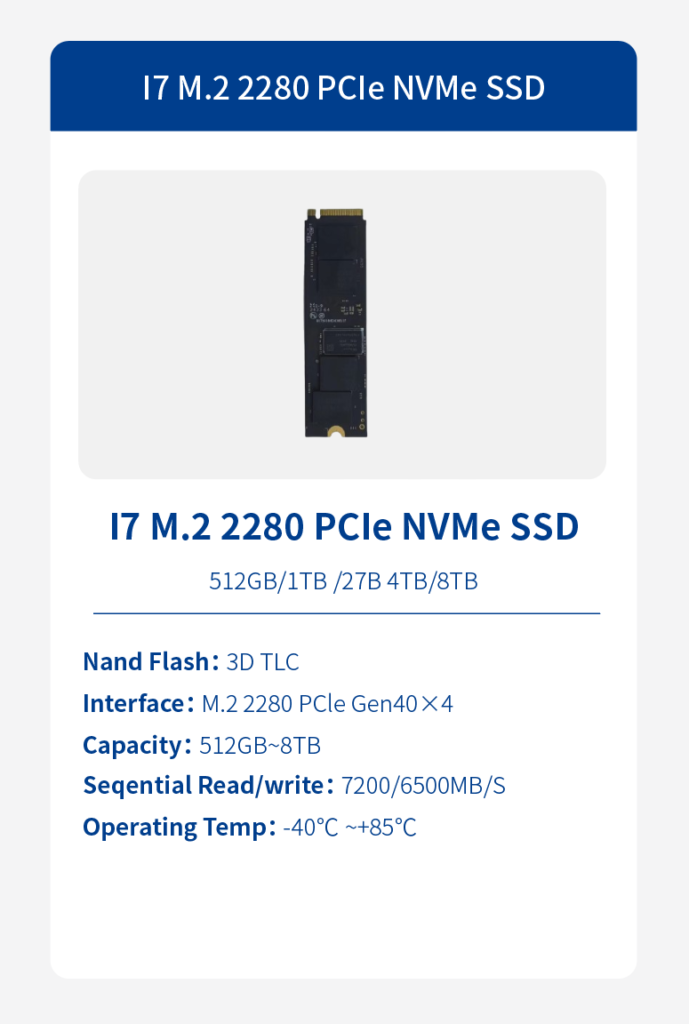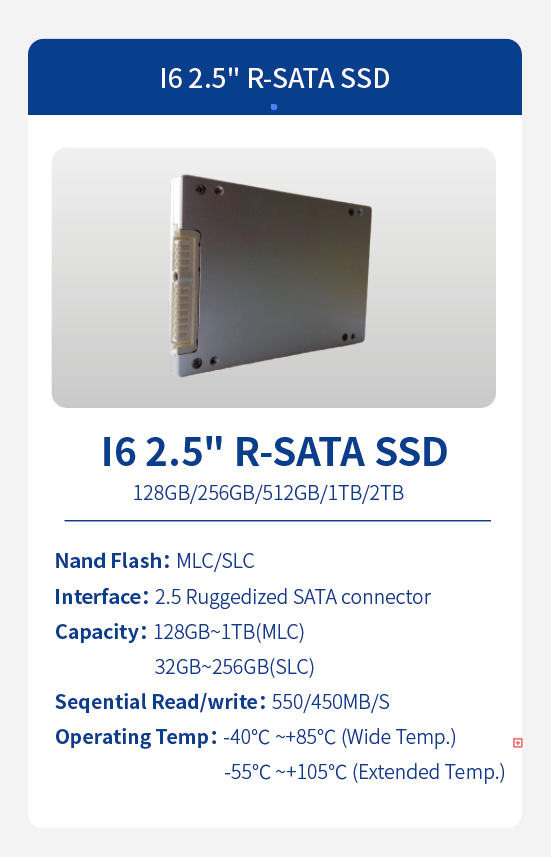Military SSD
Fulfill Most Demanding Applications for Military & Aerospace
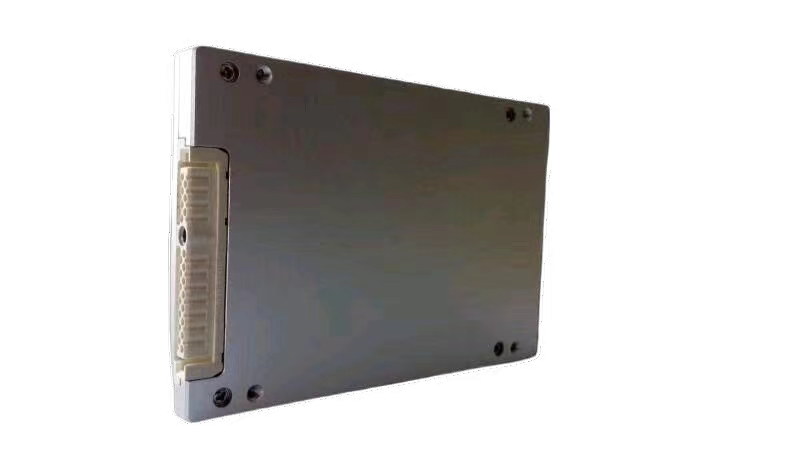
Explore our Military SSD
Indudisk military SSD is specialized storage device designed to meet stringent military standards for durability, reliability ,performance and security. Indudisk I6 Series military SSD is compliant with MIL-STD-810G standards, which guarantee the high level of shock and vibration resistance to withstand harsh environment.It is built with rugged design for defense and aerospace applications and also support enchanced data security features like quick secure erase, AES256 Encryption, power fail protection to protect data loss in case of any sudden power loss.
Key Benefits of our military SSD
Military SSDs are often built with the rugged design and the highest-quality MLC NAND or SLC NAND or industrial-grade 3D Nand TLC Flash to deliver the highest durability and relilability. Besides,Indudisk focus on military SSD for many years and adopts the leading-edge solid state drive technology to make our military SSD have enhanced data security features such as Quick secure erase,self-destruction and AES-256 encryption capability to protect sensitive information from unauthorized access and cyber threats.
Wide Temp Support Ensures High Reliability under Extreme Conditions
In addition to ruggedized design and rugged components customized to operate in the harshest environments,Indudisk I6 Series military SSD pass 100% 8-hour burn-in test to ensure reliable and consistent performance under -40°C to +85°C. And we can offer extended temp.-55°C to +105°C SSD needed.
Ruggedized design to withstand Extreme Environments
Built with rugged design,Indudisk I6 Series military SSD features MIL-STD-810G compliance along with protective conformal coating. This unmatched ruggedization enables resilience against humidity, shock, vibration in extreme environments.And we can offer 2.5 ruggedized SATA connector SSD for demanding applications.
Secure Erase/AES256 Encryption Ensure Intense Data Security
Indudisk I6 Series 2.5 SATA SSDs come with AES 256 encryption to protect sensitive information on the SSD in case of any unauthorized access and cyber threats.Besides, It also support quick secure erase and self-destruction functio to destroy key data that is in danger of being compromised in a second.
Reliable Performance
With balanced algorithm design and Static/ Dynamic Wear leveling Technology, Our military SSDs deliver reliable performance without speed drop issue.In addition, We design all of our military SSDs with Power Loss Protectin (PLP) design,which can protect data loss in case any sudden power failure.
Customized SSD
We can provide a variety of customized solutions tailored to your industry’s unique needs,such as Ruggedized SATA Connector, Quick Secure Erase,Extended operating temperature, Conformal Coating, other OEM SSD requirements.
Learn More about Military SSD Storage
Secure, Reliable and Rugged SSDs
For Defense and Aerospace Applications
In defense and aerospace applications,data storage requires working under vibration in extreme environments and maintain reliable performance for prolonged time periods without failure. Besides, we also need protect sensitive information from unauthorized access and cyber threats and 100% data integrity in case of any sudden power loss in various applications such as in-flight systems, avionic computers, black box recordings, mission data recorders, unmanned aircraft and flight data recording. Indudisk military SSDs have taken all those factors into considerations and are designed with military standards MIL-STD-810F/G requirements in mind.
How to choose the right Military SSD
SSD Sizes, Interfaces, Types,Capacities, Uses ,Features and More
Before SSD technology emerges, HDD is the main storage device . HDD is a traditional hard drive consists of a spinning disk with a read/write head on a mechanical arm called an Hard Disk. An HDD reads and writes data magnetically. The magnetic properties, however, can lead to mechanical breakdowns.
While SSD is a non-volatile storage media that stores constant data on solid-state Nand Flash chips. Now SSDs are replacing traditional HDD in computers as storage device. Because SSDs are much faster in comparision .With an SSD, the device ‘s OS will boot up more quickly ,Programs will load quicker and files can be saved faster.
Generally speaking, SSDs Solid State Drives are better than HDD for most users due to its faster speed,improved durability and quieter operation.However,HDDs offer higher storage capacity at a lower cost ,which makes it a better option for large data storage.
As an SSD buyer, it is very key to choose the right SSD product at favorable price for your project. But do you know how to choose a right SSD solution for your projects ? As an SSD expert, the starting point is to learn about your application. For example, what is your operating temperature ?Is it used as a system drive or mass capacity data transfer ? Is it mainly used for read or write operations ? What OS ? Since all answers above related to your application is very pivotal to select a right SSD that aligns perfectly with your requirements and uphold unwavering quality.
Industrial SSDs: mainly designed specifically for system designers and builders and capable of operating in extreme environments.Industrial SSDs come in a wide variety of small form factors with different interfaces.We normally require reliable performance and consistency for industrial storage solutions.
Nomrally industrial ssds are designed for high reliability and performance operating in extreme environments while consumer SSDs are cost-effective storage for everyday us.The eKey differences include operating temperature ranges, durability, write endurance, and features like power loss protection and error correction.
Industrial SSDs are crafted for resilience in extreme environments, making them ideal for various demanding applications. They boast greater endurance and reliability than consumer SSDs, thanks to their rugged design and rugged components. Industrial SSDs have significantly higher reliability and endurance, with program/erase (P/E) cycles of around 3000 to100,000 compared to only about 1,000 for consumer SSDs. This allows industrial SSDs to handle heavy workloads for much longer before wearing out. Furthermore, they are designed to endure industrial temperatue and wide temperature ranges (from -40°C to 85°C, while consumer SSDs typically only support 0°C to 70°C).
The main difference between industrial ssd and military ssd lies in the design for environmental resilience,security features and reliability.Industrial SSDs are built to withstand harsh conditions like extreme temperatures and vibrations, while military SSDs incorporate even more rigorous standards for security, data protection, and resistance to environmental stressors like shock, vibration,humidity and electromagnetic interference.
Most people are still confused to select a right SSD type . Generally speaking, this greatly depends on the operating temperature range of your application environment for the SSD. As an SSD manufacturer ,Consumer SSDs/Commercial SSDs are designed to operate at temperatures ranging from 0 degrees Celsius to 70 degrees Celsius , Industrial SSDs are designed to operate at temperatures ranging from -20 degrees Celsius to 70 degrees Celsius while military SSDs/rugged SSDs are designed to operate at temperatures ranging from -40 degrees Celsius to 85 degrees Celsius.
Generally Speaking, we can differ Industrial SSDs from military SSDs by their Operating Temperature as below:
- Commercial SSD Operating Temperature: 0C to +70C
- Industrial SSD Operating Temperature :-20C to +70C
- Military SSD Operating Temperature:-40C to +85C
If you are exploring your options for industrial flash storage, two contenders are likely to be on your list: SLC NAND and MLC NAND. Both forms of NAND flash storage are popular and reliable, and each one has its most appropriate uses. The trick is not using MLC NAND when you really need SLC, or paying for SLC when you could get by with MLC. Which NAND flash storage technology is right for your application? This comparison of SLC NAND vs. MLC NAND will help you make up your mind.
With SLC NAND, one bit of data is stored on each cell. This kind of storage is extremely important for devices in which critical data will be saved.It provides suitable reliability and greatly minimizes the risk of data loss and corruption.
With MLC Nand,MLC stands for multi-level cell with two bits of data are stored per cell.You will find it most often in commercial and industrial applications. MLC NAND is the right solution for these products because it costs less than SLC NAND.
SLC and MLC flash mermory are similar in their design. MLC SSDs cost less and allow for higher storage density. SLC SSDs provide faster write performance and higher reliability.
With TLC Nand, a triple-level cell NAND flash, stores three bits of data per cell.It is ideal for consumer grade products because the price point of TLC flash is the lowest of these three forms.
As for SSD endurance, SLC SSD is rated at approximately 100,000 PE cycles per cell. SLC SSD is is rated at approximately 10,000 PE cycles per cell. TLC SSD is rated at approximately 3,000 PE cycles per cell.While QLC is rated at approximately only 1,000 PE cycles per cell.
An SSD form factor is the size, configuration or physical arrangement of solid-state storage media.The form factor determines the media’s physical compatibility and interchangeability with other computer components or devices.
2.5″
when buying an SSD, the first thing you want to know is which form factor fits your system. SSDs come in a variety of form factors. For example,2.5″ is the most common type of SSD and fits into most laptop or desktop computers.It has a similar shape to a traditional HDD and connects over SATA cables so it offers a very familiar experience to what many are already used to.
M.2
M.2 has become the standard type of storage for slim laptops and notebooks.Its tiny form factor is often compared to a stick of gum and easy to install right on the motherboard in most cases. It is available in various lengths to enable different SSD capacities, The longer the drive,the more Nand flash chips can be mounted on it leading to higher capacity SSDs.
mSATA
mSATA or mini-SATA,is essentially a smaller version of the full-size SATA SSD,It uses a compact form factor like M.2 but not interchangeable.M.2 SSD can support both SATA and PCIe interface options whereas mSATA only supports SATA. This form factor is designed for smaller form factor systems where space is limited.
U.2
Finally,there’s U.2 which looks like a 2.5″ drive but it is a bit thicker .It uses a different connector and sends data through the PCIe interface.U.2 SSD is typically used for high-end workstations,servers and interprise applications that need greater storage.It allows higher operating temperatures and is more favorable for transferring heat than M.2 form factor.
While M.2 and NVMe are popularly used now,they actually refer to different technologies that can be used together but:
- NVMe is a storage transfer protocol specially designed for high-performance,non-volatile storage media.
- M.2 is an SSD form factor that enables high-performance storage.
- M.2 SSD connected using the NVMe interface deliver faster read/write speed
M.2 SATA SSDs use the SATA interface with a max. data transfer of 6Gbps. This is slow compared to the new NVMe intefaces. But it have 3 to 4 times the bandwidth compared to traditional HDD and is more available and affordable than a NVMe SSD. So it is a great alternative
M.2 NVMe SSDs are much more performance driven compared to M.2 SATA SSDs. By leveraging the PCIe bus, M.2 NVMe SSDs have theoretical transfer speeds of up to 20Gbps which is already faster compared to M.2 SATA SSDs with 6Gbps. PCIe buses can support 1x, 4x, 8x, and 16x lanes.
Request an Instant Quote For your Upcoming Projects Today?
Get an instant quote or let us know what you’re looking for and we’ll get back to you soon!

